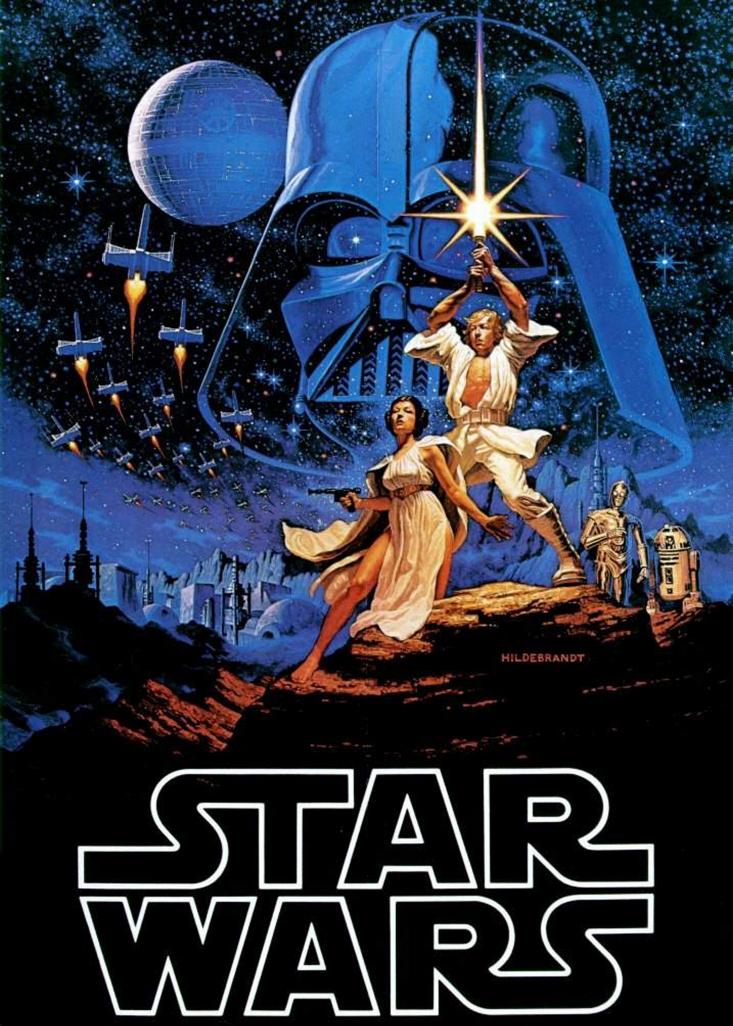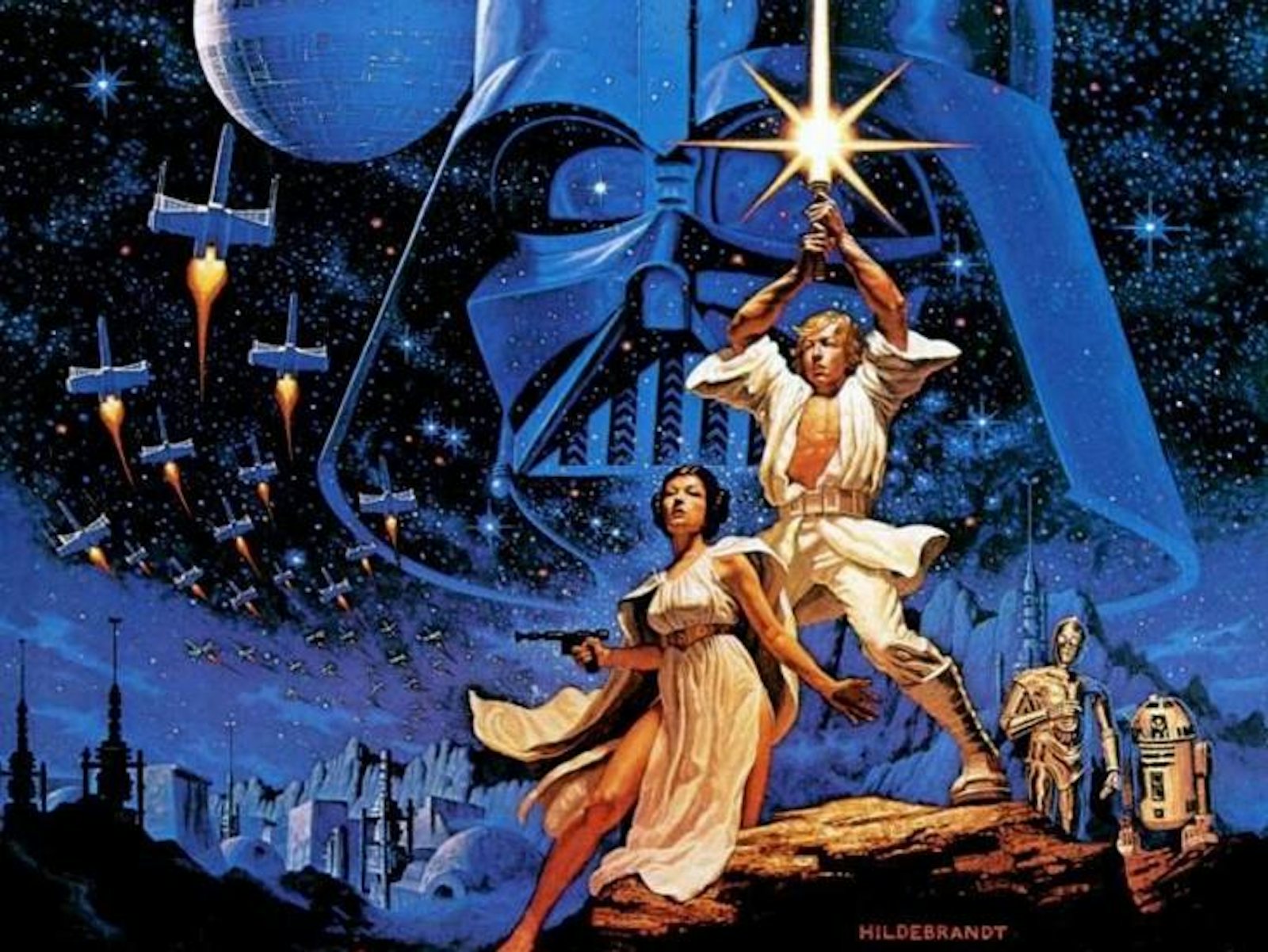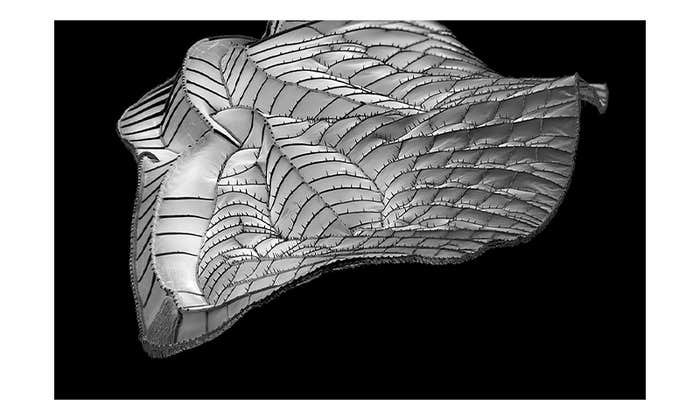We didn’t say “break the Internet” back in 1999, but if we did we could certainly say that science-fiction author David Brin broke the Internet when he wrote in Salon that “Stars Wars belongs to our dark past. A long, tyrannical epoch of fear, illogic, despotism and demagoguery that our ancestors struggled desperately to overcome, and that we are at last starting to emerge from, aided by the scientific and egalitarian spirit that [George] Lucas openly despises.” According to Brin, whose best-selling novels include The Postman, Earth, and the Hugo Award-winning Startide Rising, he received 900 emails on the first day his article appeared, many of which “had (ahem) very little good to say.”
Since then Brin has published a steady stream of critically praised novels, including his most recent, Existence. He is also a planetary astronomer who serves on the advisory council of NASA’s Innovative and Advanced Concepts group. He has remained an ardent observer of the Star Wars films—he is the “prosecuting attorney” in the book Star Wars on Trial, a mock court case about the pros and cons of the films, featuring other writers—and so we couldn’t resist checking in with him about The Force Awakens. In fact, Brin is on our minds at Nautilus because he has just written an article for us, “2015 Was the Best Year Ever in Space.” It’s suffused by his love and passion for space and adventure—both real and imagined—and it was apparent in our conversation.
So what’s your verdict on The Force Awakens?
Plot is not J.J. Abrams strong point. Where he is a genius-level storyteller is characters. He brought his characters alive and Lawrence Kasdan delivered a decent script, given the clichéd and utterly unimaginative storyline. I’ve issued a challenge for anyone out there to come show us even one scene in the latest flick that was not an homage to earlier Star Wars episodes. The most popular Star Wars film is The Empire Strikes Back. He tried to refer to it with a confrontation between father and son on a bridge. I didn’t mind that homage. But he could’ve had truly memorable dialogue. In any event the world, the universe, is filled with great ideas you can steal.
Let’s step back for a second. What do you think of the Star Wars prequel trilogy?
They are watchable if you’re stoned because they are so visually gorgeous, but the dialogue and characters are so awful that we’re insulated from the relentlessly noxious “lessons” and “messages” pushed by those three prequels. I do hope folks will notice, for example, that Yoda, in Attack of the Clones, orders the Jedi into a suicide charge that kills most of them, then conveniently shows up with the new clone army that he ordered. An act of treachery and betrayal so stunning that I had to watch the movie twice. Perhaps that was Lucas’ evil plan.
Does The Force Awakens improve on the previous films?
Abrams and Disney appear to have backed off from George Lucas’ heavy-handed propaganda. The first Star Wars film, Episode IV: A New Hope, spoke wistfully about democracy and egalitarian values. The force was only a little bit about talent and more about training: Obi-Wan offers to teach it to Han. By Episode VI, Lucas’ shift in perspective was becoming plain. More and more the story was about mutant demigods, “chosen ones,” fated from birth to be superior not by quantity, but by basic quality. Lucas became less the egalitarian, intellectually curious creator of the Young Indiana Jones Chronicles and more a passionate pusher of the “chosen one” demigod theme. This became explicit when Lucas introduced “midi-chlorians” and mystical genetic mumbo jumbo in the prequels. Referring to Anakin Skywalker’s virgin birth and tying most of the force demigods together—good and evil—all in the same mutant family. His portrayal of the Republic poured contempt. The Galactic Republic never does anything in any the first six films. It doesn’t even try to do anything.
Do you think Lucas’ departure from egalitarian virtues was reflected in the easy redemption that Darth Vader receives for killing the Emperor, which seems to wash away his previous sins?
Absolutely. The apotheosis of Darth Vader was truly disgusting. Saving one demigod—a good demigod, his son—wiped away all his guilt from slaughtering billions of normal people. Those who say I am reaching too far should look up George Lucas’ infamous interview with the New York Times in which he openly and explicitly disdains democracy and declared that the best form of government is to have a “good despot.” I wrote about this in Salon, infuriating some fans but delighting others, by pointing out how that nasty little green oven mit Yoda is pretty much, inarguably, the most evil figure ever in the history of any human mythology. I have defied folks to name one time when he says or does anything that is indisputably wise. The trail of destruction that follows him and every decision that he makes is inarguable and overwhelming.
Mace Windu, on the other hand, is the only intelligent Jedi depicted in any film. He found evidence of Senator Palpatine’s plot. Mace wanted to tell the Republic—Yoda overruled him. When all the other Jedi are falling into a stupid trap ordered by Yoda, Mace is the one who does his job as a secret agent, sneaks up to the balcony, and puts a light saber to the bad guy’s throat. If one Jedi more had accompanied him, it would’ve been over. Mace, in confronting Palpatine, was the only one who tries to do what the Jedi are supposed to do, but he fails because Yoda screwed up the training of the dangerous apprentice, Anakin, and orders the Jedi to do a frontal assault into an arena filled with a hundred thousand laser wielding enemies.
You’ll notice, in the new film, a Jedi master had trained an apprentice who then kills all his other apprentices, leading the Jedi master to go off somewhere across the stars to sulk until “a new hope” finally tracks him down. Does that sound familiar? After Yoda and Obi-wan both do exactly that, might Luke have tried something different? Anyway, stirring up that hornet’s nest was fun. It lead to my being assigned the role of prosecutor in Stars War on Trial. Lucas appointed one of his novelizers to be the Defense Attorney and we had a blast calling witnesses pro and con over a series of charges.
What do you think was the result of the exchange you had in Star Wars on Trial?
Absolutely freaking nothing. Does entertainment have to have an outcome? We were doing it for fun. Fortunately, Lucas’ propaganda for evil is completely ineffectual. Almost none of the viewers who have enjoyed his films, and count me as one of them, even notice his sneering contempt for democracy and the common man. Though it appears that it has not gone unnoticed in China, where many commentators have spoken about the core lesson of Star Wars—that democracy is futile. But much simpler moral lessons are absorbed by kids: be brave, defend your friends, try to be nice. Those simple messages from the first and second films could not be washed away and they are the ones that kids take home. So while I have fun poking at the deeper moral lapses, I can sleep well knowing that almost nobody is listening when George Lucas vamps for evil. All they notice is the fun.
Is it because you’re a science-fiction author that you scrutinize Star Wars so deeply?
I have no idea. It’s probably because I take mythology very seriously. I think that it can either prepare us for our task in creating a decent civilization, or it can undermine our confidence. The first three Mad Max films, despite their patterns of lovely entertaining post-apocalyptic violence, actually had thoughtful moments reflecting upon what civilization might be. The latest one, also popular, had none of that. Its portrayal of evil, with the red glowing eyes and a clichéd facemask, didn’t rouse any thoughtfulness. There are no moments, amid the orgy of fun explosions, when they chose to give something for the mind. Mind you, Steven Spielberg does, in every film. There are always little moments that tweak a little intellectual curiosity. In fact, Lucas used to do this. I cited the Young Indiana Jones Chronicles: They were filled with joy at presenting characters who were only 90 percent action stars and sometimes paused to think a little and share those thoughts with the audience.
You’ve said civilization has been damaged and it shows in The Force Awakens. What do you mean?
Why do almost no films ever show civilization functioning, institutions doing their jobs, democracy working? The answer is simple: laziness. A storyteller’s job is to keep his or her characters in pulse-pounding jeopardy for 90 minutes of film, or 600 pages of a novel. It’s hard to do that if they can dial 911 and get skilled professionals to come to their aid. So you see a panoply of tricks used by directors and authors to deny their characters useful aid. That’s fine, but when the trick is to simply spread the assumption that there are no decent civil servants, there are no smart cops, there are no loyal first responders out there, then that spreads a propaganda message that such things are impossible in our real world. It takes real writing to come up with a way of keeping your characters in jeopardy, despite there being skilled professionals who want to help them.
Abrams or Kasdan did not push this demoralizing lesson, and I applaud them for that, but they simply eliminated the Republic as a potential source of aid by having the First Order slaughtering billions of people. How much better would it be if they showed the Republic sending its fleet to help and it was kept at bay by the First Order’s fleet? Then you have a chance for three minutes of rollicking space battle that gives the Rebellion just enough of a gap to get through and attack the super mega granddaddy Death Star. It would be more exhilarating, and it would also say you know the Republic isn’t useless. It’s not going to save the day—that’s going to be our heroes—but it could help them, and then you would come away with a notion that civilization isn’t futile. It can help the heroes even if just a little bit.

Brian Gallagher is an assistant editor at Nautilus. @brianscottg






























